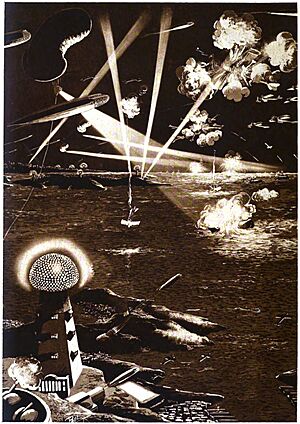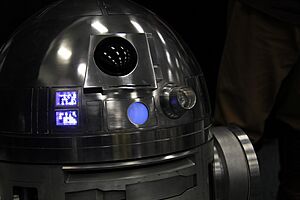Outline of science fiction facts for kids

Science fiction is a super cool type of story that explores what might happen if new science or technology existed. It often takes place in the future or in space! Think about robots, spaceships, or time travel. Science fiction is sometimes called a "literature of ideas" because it makes us think about the future and how new inventions could change our world.
Contents
- What is Science Fiction?
- Types of Science Fiction Stories
- Related Story Types
- Science Fiction Around the World
- History of Science Fiction
- Elements and Themes
- Science Fiction Works
- Information About Science Fiction
- Science Fiction Community
- Awards for Science Fiction
- Famous Science Fiction Franchises
- See Also
What is Science Fiction?
Science fiction is a huge and exciting type of story! It's actually pretty hard to give it just one simple definition because it covers so many different ideas and topics. People sometimes disagree on where science fiction ends and other types of stories begin.
Science fiction is a kind of:
- Fiction: This means it's a made-up story, not something that really happened. Authors use their imagination to create characters, places, and events.
- Genre fiction: This is fiction written to fit into a specific style or type, like mystery, fantasy, or, of course, science fiction. Readers who love a certain genre often look for new books in that same style.
- Speculative fiction: This is a bigger group of stories that includes science fiction, fantasy, and horror. It's all about "what if?" questions.
- Genre: Science fiction is a popular genre, or category, of stories.
Types of Science Fiction Stories
Within science fiction, there are many different "subgenres," which are like smaller categories. Think of it like different flavors of ice cream! There are over 30 different types of science fiction stories.
Focus on Science
Some science fiction stories focus a lot on the science and technology.
- Hard science fiction: These stories pay close attention to scientific details and try to be as accurate as possible. They often use real science or ideas that could actually happen.
- Mundane science fiction: This is a type of hard sci-fi that keeps stories on Earth or within our Solar System. It uses technology that is either real now or could be invented soon.
- Soft science fiction: These stories focus more on the characters and their feelings, or on how society changes because of new technology. The scientific details might not be as important or accurate.
Story Characteristics
Science fiction often explores certain themes, settings, or plot ideas.
- Apocalyptic and post-apocalyptic science fiction: These stories are about the end of the world or what happens after a big disaster.
- Biopunk: This type of story looks at the future of biotechnology and genetic engineering. It often shows a dark world with biohackers and new kinds of life forms.
- Cyberpunk: Imagine a future with super advanced computers and technology, but also a lot of poverty and crime. Cyberpunk stories often have a dark, gritty feel.
- Climate fiction: These stories focus on the effects of climate change and global warming on our planet.
- Military science fiction: These stories are about wars fought in space or with futuristic weapons.
- Steampunk: This genre mixes old-fashioned steam-powered technology (like from the 1800s) with futuristic inventions. Think Victorian England with robots!
- Time travel: Stories where characters can go back to the past or forward to the future.
- Space colonization: Stories about humans building new homes on other planets or in space.
- Space opera: These are big, exciting adventures set in space, with brave heroes, evil villains, and amazing alien worlds.
- Social science fiction: These stories are less about technology and more about how new ideas or inventions change human society.
Movements and Ideas
Some science fiction stories explore different political, philosophical, or social ideas.
- Feminist science fiction: These stories look at gender roles and equality in future societies.
- Libertarian science fiction: These stories often explore ideas about freedom and limited government.
Historical Eras
Science fiction has changed over time. These genres describe when the stories were created.
- Scientific romance: This was an early name for science fiction, especially popular in the United Kingdom a long time ago.
- Golden Age of Science Fiction: This was a special time in the 1940s when science fiction became very popular and many classic stories were written.
- New Wave science fiction: In the 1960s and 70s, this movement brought new, experimental ways of telling science fiction stories.
Mixed Genres
Sometimes, science fiction mixes with other types of stories.
- Alternate history science fiction: These stories imagine a world where a big historical event happened differently, changing the future.
- Comic science fiction: Science fiction stories that are funny!
- Science fantasy: This genre blends science fiction elements with magic and fantasy.
- Science fiction romance: Stories that combine futuristic settings with love stories.
- Science fiction mystery: These stories are like detective novels, but with futuristic clues and settings.
- Space Western: Imagine cowboys in space! These stories mix Western themes with futuristic space settings.
Related Story Types
Science fiction is part of a bigger family of stories.
- Fantasy: Stories with magic, mythical creatures, and imaginary worlds.
- Horror fiction: Stories meant to scare you!
- Utopian and dystopian fiction: Stories about perfect societies (utopias) or very bad ones (dystopias).
- Superhero fiction: Stories about people with amazing powers.
Science Fiction Around the World
Science fiction is popular all over the globe! Different countries have their own unique styles and famous writers.
- Australian science fiction
- Chinese science fiction
- French science fiction
- Japanese science fiction
- Russian science fiction
- Spanish science fiction
History of Science Fiction
Science fiction has a long and interesting history, going back hundreds of years. People have always imagined what the future might hold!
Elements and Themes
What makes a science fiction story feel like science fiction? It's often about the characters, the plot, and the setting.
Characters
- Aliens: Many science fiction stories feature beings from other planets!
Plot Ideas
Cool Inventions
- Hyperspace: A fictional way to travel faster than light, often used to cross vast distances in space quickly.
Settings
The setting is where the story takes place. In science fiction, settings can be very imaginative!
Places
- Parallel universes: Other versions of our universe, where things might be slightly or totally different.
- Other planets: Stories often take us to alien worlds with strange landscapes and creatures.
- Future Earth: Sometimes, stories show us what our own planet might look like in the future.
Society and Culture
- Utopias and Dystopias: Imagined perfect societies (utopias) or terrible, oppressive ones (dystopias).
Main Themes
- First contact: This theme explores what happens when humans meet aliens for the first time.
Technology in Stories
Technology is a huge part of science fiction.
- Computer technology:
- Artificial Intelligence (AI): Robots or computers that can think and learn like humans.
- Mind uploading: The idea of putting a human mind into a computer or a new body.
- Transportation:
- Flying cars: Cars that can fly!
- Space docks: Stations in space where spaceships can land and get repaired.
- Futuristic weapons: Lasers, ray guns, and other advanced weapons.
- Space warfare: Battles fought between spaceships or armies in space.
Science Fiction Works
Science fiction isn't just in books! It's in movies, games, and art too.
Art
- Science fiction comics: Graphic novels and comic books with sci-fi stories.
Games
- Video games: Many popular video games are set in futuristic or space environments.
- Space flight games: Games where you can pilot spaceships and explore the galaxy.
Books
- Science fiction comics
- Novels: Long science fiction stories.
- Short stories: Shorter science fiction tales.
Where to Find Short Stories
- Magazines: Many famous science fiction stories first appeared in special magazines.
Movies and TV
- Movies: Blockbuster films like Star Wars and Avatar are great examples.
- TV shows: Series like Doctor Who and Star Trek have entertained fans for decades.
Information About Science Fiction
There are many places to learn more about science fiction.
- Internet Speculative Fiction DataBase: A huge online collection of information about sci-fi books and authors.
- The Encyclopedia of Science Fiction: A massive online encyclopedia dedicated to science fiction.
Science Fiction Community
Science fiction fans love to connect!
- Conventions: Big events where fans meet, dress up, and celebrate their favorite stories.
- Fandom: The community of science fiction fans.
Awards for Science Fiction
The science fiction world has many awards to celebrate the best books, movies, and art each year.
International Awards
These are some of the most famous awards given around the world:
| Years awarded | Name | Description |
|---|---|---|
| since 1953 | Hugo Award | One of the oldest and most famous awards for general science fiction. |
| since 1965 | Nebula Award | Another very important award for science fiction and fantasy. |
| since 1970 | BSFA award | For British science fiction. |
| since 1972 | Saturn Award | For science fiction films and television shows. |
| since 1973 | John W. Campbell Memorial Award | For the best science fiction novel. |
| since 1979 | Prometheus Award | For libertarian science fiction. |
| since 1987 | Arthur C. Clarke Award | A major award for science fiction. |
Awards by Country
Many countries have their own awards for local science fiction.
- Australian
-
- Aurealis Award
- Canadian
-
- Prix Aurora Awards
- Chinese
-
- The Galaxy Awards
- Japanese
-
- Nihon SF Taisho Award
Awards for New Artists
- Compton Crook Award—for the best first novel by a new author.
- John W. Campbell Award—for the best new writer.
Famous Science Fiction Franchises
Many science fiction stories grow into huge "franchises" that include movies, TV shows, video games, toys, and more! The Star Wars series is one of the most successful science fiction franchises ever.
Here are some popular space science fiction franchises:
- Alien (movies about scary aliens since 1979)
- Battlestar Galactica (TV shows about humans fighting robots in space since 1979)
- Doctor Who (a British TV series about a time-traveling alien since 1963, with many spin-offs)
- Dune (books and movies about a desert planet with giant sandworms)
- Godzilla (movies about a giant monster since 1954)
- Halo (started as a video game in 2001, now includes books and TV shows)
- The Hitchhikers Guide to the Galaxy (a funny series of books, movies, and radio shows)
- Men in Black (movies about secret agents who protect Earth from aliens)
- Mobile Suit Gundam (Japanese anime about giant robots fighting in space since 1979)
- Planet of the Apes (movies about a future where intelligent apes rule Earth)
- Predator (movies about a powerful alien hunter)
- Star Trek (TV shows and movies about space exploration and adventure since 1966)
- Star Wars (a huge universe of movies, TV shows, and games about a galaxy far, far away since 1977)
- Stargate (movies and TV shows about traveling to other planets through ancient portals)
- Transformers (TV shows and movies about giant robots that can change into vehicles)
- The War of the Worlds (a classic story about an alien invasion, first published in 1897, with many adaptations)
- Warhammer 40,000 (a tabletop game with a dark futuristic setting, also has many books and video games)
See Also
- List of science fiction themes
- Timeline of science fiction


